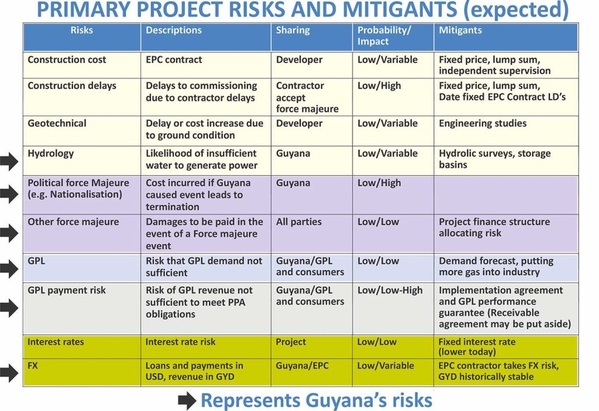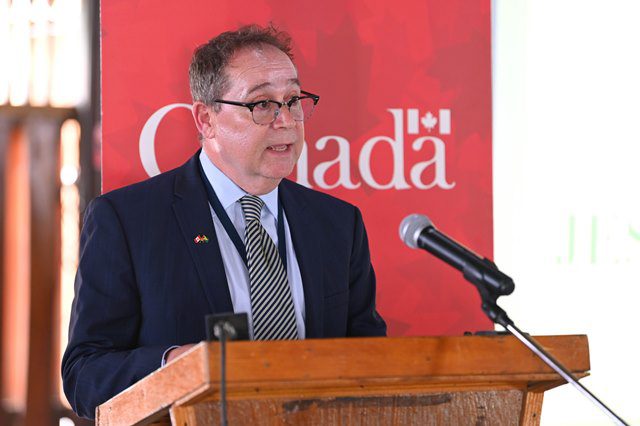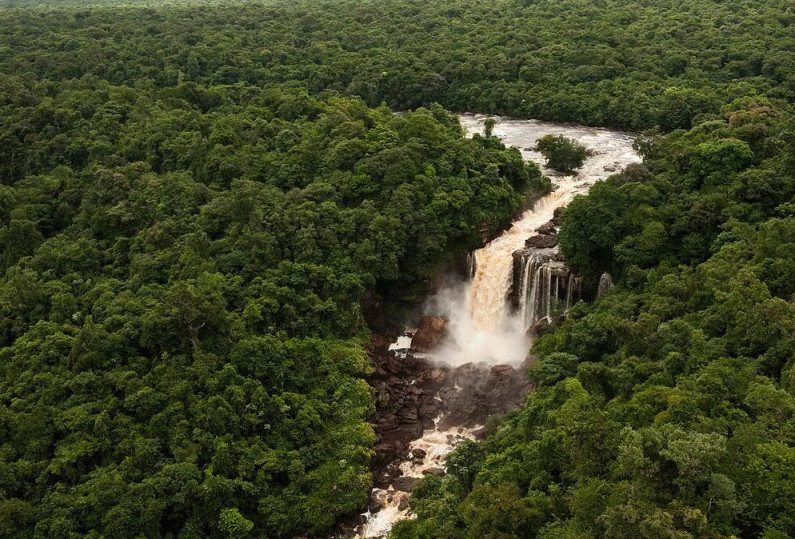June 1 ,2022
Kaieteur News – Almost two decades since it was first promulgated as a solution to Guyana’s energy demands but had to be shelved on many occasions, the recently resuscitated 165 Mega Watt (MW) Amaila Falls Hydro Electric Project has again been met with another snafu.
This was confirmed by Vice President Bharrat Jagdeo, who during a press engagement at the Office of the President on Monday, reported that the Chinese Contractor – China Railway First Group – had been unable to secure the finances.
According to the Vice President, the contractor had as late as April 22, last, written to the government “saying that they are having a hard time doing the BOOT (Build, Own, Operate Transfer) contract and they want to shift to an EPC (Engineer, Procure, Construct) plus finance” option instead.
He explained that under an EPC contract, it would mean that the government would have to secure the finances for the project and that they would be used as the EPC contractor.
As such, Jagdeo disclosed that in light of the developments, government may very well have to retender the project.
“We have been in discussion with the company since November last year, the discussions, the negotiations are very difficult,” according to Jagdeo who indicated that “in the negotiations, we are still trying to get them to meet the commitment that they bid.”
Qualifying his position further, the Vice President sought to remind that during its most recent incarnation, where Sithe Global of the Blackstone Group had been selected as the Project developer, the electricity was supposed to have been sold to consumers at a generation cost of US$0.10 (cents) per kilowatt hour (KwH).
The Chinese bid, he said, had committed to 7.7 Kwh but are now saying “they can’t go ahead with the BOOT they want to change the basis to an EPC.”
He was adamant, however, “if we can’t change that, if we can’t get it done under the BOOT we will have to retender, they would not be able to conclude the construction, because that is what the tender was about, a BOOT model not an EPC+ finance model.”
He told members of the press corps “…in the last six months or so we have been struggling to reach agreement and so we are now going to have to give a deadline to cancel; if they can’t proceed as the original model so we may have a set back there on that.”
Asked to provide further clarity on the contractor’s position during the ongoing negotiations, Jagdeo divulged that it was not a case of the Chinese not being in favour of a BOOT arrangement but rather “they simply can’t raise the financing, because of that.”
Under the BOOT, arrangement, he said, it “meant they had to build it, own it and supply us with power at a particular price and then 20 years after transfer it to the government for free, because that is what they bid on.”
In such an arrangement, Jagdeo said, “…we would not have any debt, there would be no debt associated so that model they are saying they can’t pursue.”
According to Jagdeo, the Chinese are requesting that government contract the debt and use them as the contractor “so we said we did not bid for that.”
He noted, nonetheless, that in such a situation, government would have started the process all over again by retendering.
Senior Minister in the Office of the President, with responsibility for Finance, Dr. Ashni Singh in January last had announced that the Chinese contractor, who was granted approval to construct the Amaila Falls Hydropower Project, would commence operations on the mega venture this year.
He was at the time presenting Budget 2022 to the National Assembly, “regarding renewable and low carbon energy, our most promising venture continues to be the AFHP (Amaila Falls Hydropower Project) with an expected capacity of 165 MW.”
He informed then that government had already requested, received and evaluated proposals for the project and negotiations were in progress with the ‘highest ranked company’ China Railway First Group (CRFG) – the same company that had previously signed a contract to build the said project several years ago.
Jagdeo in November of last year, during a press engagement, told reporters that a decision had been taken by Cabinet that government would be approaching the selected contractor to negotiate on the way forward.
The Ministry of Finance, in a subsequent public missive corroborated the Vice President’s assertions saying, that Cabinet had given its ‘No Objection’ to the company, as evaluated by the National Procurement and Tender Administration Board (NPTAB).
In this regard, the AFHP will be developed under a ‘build-own, operate-transfer (BOOT) arrangement where the developer would operate the project for a 20-year period before handing it over to the government, at no cost.
The Finance Minister had explained, “The project will be developed under a build-own operate-transfer (BOOT) arrangement within which the Guyana Power and Light Incorporated (GPL) will purchase power from the operator under a Power Purchase Agreement (PPA). We anticipate that construction will begin in 2022 and be completed by 2027. Once operationalised, the facility will reduce the cost of energy significantly for both businesses and households.”
At that time, the Vice President was of the view, “…we have a really great bid” and explained that in this iteration of the Amaila Falls Hydro Electric Project, “we are not going to put any money into the project, we are just buying power.”
Jagdeo in February this year, however, despite conceding months of negotiations with the Chinese, had in lauding the project during the International Energy Conference and Expo 2022 at the Kingston, Georgetown Marriott Hotel, said his government was currently negotiating a Power Purchase Agreement (PPA) with the Chinese contractor.
Government had earlier in the year advertised soliciting a private partner to fund and develop the project.
The administration in inviting partners had indicated two proposals, namely a BOOT option or a Design Build Finance option.
At the time of selecting China Railway First Group, it was noted that the BOOT option would be utilised.
According to the administration, a total of four companies submitted proposals, and China Railway Group Limited was identified as the most ‘capable partner’ by the Evaluation Committee after a rigorous evaluation process, following which NPTAB submitted the relevant recommendation to Cabinet for ‘no objection’.
It should be noted that checks conducted by this publication found that China Railway was in 2019 debarred by the World Bank for practices considered fraudulent on a highway project in the country of Georgia.
China Railway was established in 1950 and is a subsidiary of China Railway Engineering Group (CREG).
Jagdeo during his press engagement on Monday, in defending the move to retender the project said that the second closest bidder would not be feasible since the cost would work out to more than that of the Gas-to-Shore project.
It should be noted that under the most recent iteration of the project as presented, Guyana was to stand the majority of the major risks involved in the project.
These include those related to political force majeure, payments risks in the event that electricity sold is not sufficient to meet the PPA demands, and hydrology where Guyana stands the risk associated with the likelihood of there being insufficient water supply, meaning if the Amaila Falls runs dry, among other risks.


















